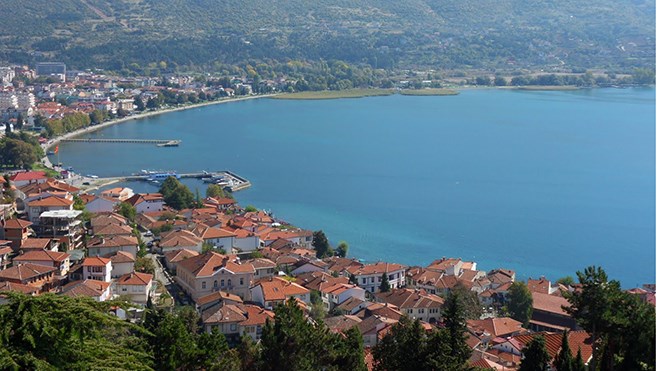Seven thousand kilometres away from their usual classroom, a group of Laurentian University students spent three weeks this spring on a unique ‘field study’ course in Geography.
The eight students travelled to the Republic of Macedonia in May, exploring the capital of Skopje and working alongside students from Saints Cyril and Methodius University.
The field study course was designed by Laurentian University’s Dr. Jorge Virchez, Associate Professor in the Department of Geography. After being invited to collaborate on some research with an old friend in Macedonia, Dr. Virchez decided to use the occasion to create a learning opportunity for his students, and devised a course outline.
“I thought this would be an ideal way for our students to learn about a place that is fascinating, and that they probably would not see otherwise,” said Dr. Virchez. “It is a beautiful country with a rich history, and I know from past experience that students really benefit from first-hand learning.”
“I didn’t know much about Macedonia, apart from the story of Alexander the Great,” said Janik Guy, now beginning her fourth year in Communications publiques/études journalistiques. “It was really impressive to find so much diversity in language and religion, and so much history, in such a small country.”
One of the poorest countries in Europe, the Republic of Macedonia has a population of just over 2 million. Its main ethnicities are Macedonian, Albanian, Turkish and Roma. Although a 1963 earthquake destroyed much of the historic capital, Skopje’s newer buildings still reflect its history, says Guy. “You see European influences, Turkish influences; it’s a really unique and surprising blend of cultures in the architecture.”
The Canadian students found a friendly—if occasionally puzzled—welcome from Macedonians. “We stood out for sure!” says Guy. “It wasn’t a very touristed area and we definitely had the tourist look going. People were curious as to where we came from.” Connections were made quickly, she adds. “Once we told them we were from Canada, almost everyone had a story about a brother or some other relative who made it to Toronto or Montreal.”
After a few days in the capital city, the Laurentian students travelled to the mountainous region of Prilep, where they worked alongside Macedonian students in conducting interviews with elderly village residents, many of whom raise sheep and tend small gardens. Guy says it was enlightening to hear their stories and to explore another way of life. “I think they’re more value-oriented, where we in North America are more goal-oriented,” she says. “They see long-term, longer time-horizons, and we’re all ‘instant.’ They’ll take ‘the long way home.’ The pace of life is so different.”
Jordan Babando, a Master’s student in Sociology, was also keen to sign up for Professor Virchez’ field study course. “I started doing some research about the area and its history, and Dr. Virchez also sent us digital presentations on the Balkans. Nothing you can read about a culture will really prepare you for the actual experience. I learned much more from the trip than any slide presentation could have given me.”
Babando was particularly impressed by the kindness and hospitality shown by the Macedonians, and by their close relationship with both their land and their history. “For example, in the remote mountain villages of Mariovo, I heard the story of this area named for the lady of the land. A foreign emperor wanted to take over the land. He was in love with Mariovo and asked for her hand in marriage. She accepted, but in return she asked that the region’s inhabitants be allowed to keep practicing Christianity. The region of Mariovo is still mainly Christian and is filled with old churches with the most beautiful artwork,” he says.
Asked for words of advice to future students who might have the chance to take a cultural geography course, Babando said “Get ready for a great experience. You may suffer culture shock, but it’s worth it, and the food is amazing. Don’t miss out!”
